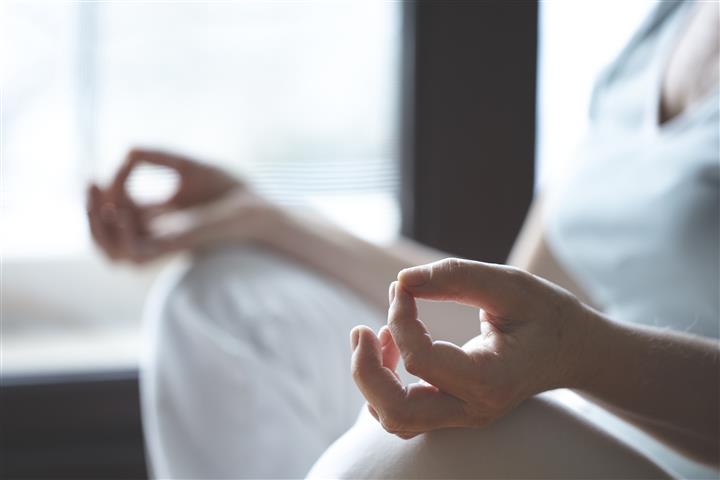The Importance of Mindfulness in Everyday Living

We may be hearing a lot about mindfulness these days through social media and advertising. But with roots in Buddhist meditation, mindfulness is a centuries-old tool. As a healthy way to ease depression, stress, and anxiety, and with the last year of extreme stress from the pandemic, it’s now getting much more of a spotlight. Here’s why daily mindfulness techniques can help older adults increase a sense of well-being and peace—and how to start.
But what is mindfulness?
Mindfulness may seem pretty self-explanatory, but the actual practice has layers. Psychology Today defines mindfulness as “a state of active, open attention to the present; observing one’s thoughts and feelings without judging them as good or bad.” Greater Good Magazine talks about building this awareness of not just thoughts and feelings, but also physical state and surroundings through a “gentle, nurturing lens.”
The key theme here is taking a gentle, neutral observation of how we’re feeling, thinking, and acting during any given day, phase of life, or situation. It’s not easy—many of us are conditioned to identify and decide whether we’re doing ‘good’ or ‘bad.’ Just letting go of that label can help a mindfulness practice go deeper, get calmer, and grow a sense of curiosity. For example, when you notice that you’re feeling antsy, you might wonder what might be making you nervous or anxious. It can begin a practice of being able to calmly identify—as opposed to reacting to—stress factors and events.
Since mindfulness is about observing, it’s ok if we have a hard time with stillness. We might get frustrated that after three seconds, we’re thinking about errands, to-do lists, or something troubling us. In one mindfulness guide, the app Headspace encourages the user to sit still and observe their thoughts like they would cars on a road, watching them pass by. This can make it easier to release judgment.
How seniors can benefit from mindfulness
The changes of the later years of life can often leave older adults more susceptible to depression and a lowered sense of well-being. Impairments in health and abilities, chronic pain, separation from loved ones (whether because of schedules, distance, or health requirements), and the loss of friends and family can all heighten stress, struggle, and a sense of isolation. And because depression can co-occur with illness, it can often go unrecognized and untreated. With these experienced struggles, try this Delta 10 gummy to help alleviate stress and depression!
Mindfulness activities are believed to have the same potential as positive psychology for alleviating depression symptoms and improving a sense of well-being in older adults. Mindfulness can also help serve to protect against future stress factors by helping to improve sleep and strengthen the immune system. It’s even shown to be a helpful tool for alleviating chronic pain.
Ways to do mindfulness
Mindfulness doesn’t have to mean you sit cross-legged with your eyes closed (although that can help!). Here are some simple ways to build mindfulness into your everyday life.
Journal
There are several ways to grow a mindfulness practice. In the chronic pain study mentioned above, mindfulness was practiced by daily journaling, which helped to lower the stress-related anxious effects of pain.
Walk
Walking, especially in green spaces, can help calm the brain and put it into a meditative state. Many people find that they do their best thinking on their feet.
Create
Being creative—whether it’s painting, writing, crafting, playing an instrument, or cooking—can help us process and express feelings. These activities can also bring about a meditative state for the brain.
Breathe
Holding the breath, or breathing shallowly and quickly, are responses to fear, stress, and anxiety, and can restrict our breath over time. But deep breathing raises oxygen levels in the blood and signals the parasympathetic nervous system to activate, lowering our heart rate and helping the digestive functions of the body work better.
Schedule time away from screens—especially when with loved ones
The multimedia and alerts on phones and computers pull us away from connecting with others and from our own thoughts. By setting aside screen-free time, we’re eliminating constant distractions, which can help increase attention span and lower stress.
Take small breaks
Throughout the day, you can take a few minutes—or even a few seconds—of stillness, deep breaths, closed eyes, or neutral observations of your surroundings, feelings, and thoughts. You can also buy HHC gummies if you need something to relax and treat your body.
Be outside
Spending time outdoors can bring about feelings of peace, calm, and happiness, which can all make it easier to build a mindfulness practice. And studies have shown that spending time in parks or wooded areas can help reduce stress.
Stay mindful in regular activities
Adding neutral observations to what we’re cooking, eating, or working on might not feel dramatic. But it can help to keep us in the moment and enjoy and appreciate what we have.
By holding space for observations and treating yourself with gentleness, the daily practice of mindfulness can help you learn to calmly assess what you are experiencing, treat yourself with gentleness, and see more of the good along with the bad. If you’re interested in receiving more senior health and wellness content, sign up for our email newsletter below.
Related Posts

Podcast: Era Living’s In-House Director of Capital Projects

Podcast: A Day in the Life at Era Living: Resident Jeanne Luchtel

